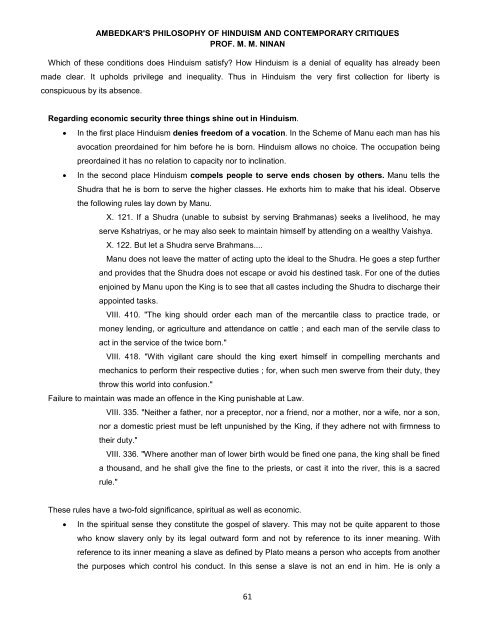Ambedkar-Philosophy of Hinduism
You also want an ePaper? Increase the reach of your titles
YUMPU automatically turns print PDFs into web optimized ePapers that Google loves.
AMBEDKAR'S PHILOSOPHY OF HINDUISM AND CONTEMPORARY CRITIQUES<br />
PROF. M. M. NINAN<br />
Which <strong>of</strong> these conditions does <strong>Hinduism</strong> satisfy? How <strong>Hinduism</strong> is a denial <strong>of</strong> equality has already been<br />
made clear. It upholds privilege and inequality. Thus in <strong>Hinduism</strong> the very first collection for liberty is<br />
conspicuous by its absence.<br />
Regarding economic security three things shine out in <strong>Hinduism</strong>.<br />
• In the first place <strong>Hinduism</strong> denies freedom <strong>of</strong> a vocation. In the Scheme <strong>of</strong> Manu each man has his<br />
avocation preordained for him before he is born. <strong>Hinduism</strong> allows no choice. The occupation being<br />
preordained it has no relation to capacity nor to inclination.<br />
• In the second place <strong>Hinduism</strong> compels people to serve ends chosen by others. Manu tells the<br />
Shudra that he is born to serve the higher classes. He exhorts him to make that his ideal. Observe<br />
the following rules lay down by Manu.<br />
X. 121. If a Shudra (unable to subsist by serving Brahmanas) seeks a livelihood, he may<br />
serve Kshatriyas, or he may also seek to maintain himself by attending on a wealthy Vaishya.<br />
X. 122. But let a Shudra serve Brahmans....<br />
Manu does not leave the matter <strong>of</strong> acting upto the ideal to the Shudra. He goes a step further<br />
and provides that the Shudra does not escape or avoid his destined task. For one <strong>of</strong> the duties<br />
enjoined by Manu upon the King is to see that all castes including the Shudra to discharge their<br />
appointed tasks.<br />
VIII. 410. "The king should order each man <strong>of</strong> the mercantile class to practice trade, or<br />
money lending, or agriculture and attendance on cattle ; and each man <strong>of</strong> the servile class to<br />
act in the service <strong>of</strong> the twice born."<br />
VIII. 418. "With vigilant care should the king exert himself in compelling merchants and<br />
mechanics to perform their respective duties ; for, when such men swerve from their duty, they<br />
throw this world into confusion."<br />
Failure to maintain was made an <strong>of</strong>fence in the King punishable at Law.<br />
VIII. 335. "Neither a father, nor a preceptor, nor a friend, nor a mother, nor a wife, nor a son,<br />
nor a domestic priest must be left unpunished by the King, if they adhere not with firmness to<br />
their duty."<br />
VIII. 336. "Where another man <strong>of</strong> lower birth would be fined one pana, the king shall be fined<br />
a thousand, and he shall give the fine to the priests, or cast it into the river, this is a sacred<br />
rule."<br />
These rules have a two-fold significance, spiritual as well as economic.<br />
• In the spiritual sense they constitute the gospel <strong>of</strong> slavery. This may not be quite apparent to those<br />
who know slavery only by its legal outward form and not by reference to its inner meaning. With<br />
reference to its inner meaning a slave as defined by Plato means a person who accepts from another<br />
the purposes which control his conduct. In this sense a slave is not an end in him. He is only a<br />
61


















